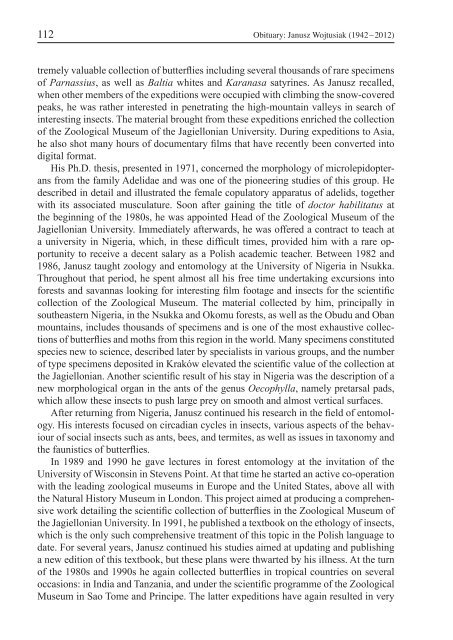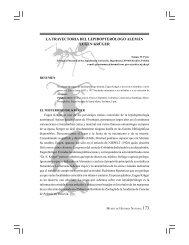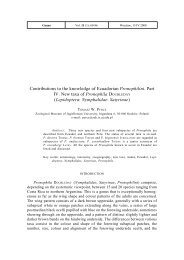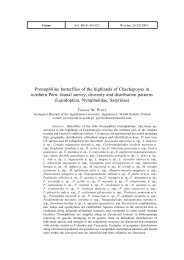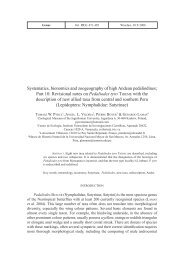Janusz Wojtusiak
Janusz Wojtusiak
Janusz Wojtusiak
- No tags were found...
Create successful ePaper yourself
Turn your PDF publications into a flip-book with our unique Google optimized e-Paper software.
112 Obituary: <strong>Janusz</strong> <strong>Wojtusiak</strong> (1942 – 2012)tremely valuable collection of butterflies including several thousands of rare specimensof Parnassius, as well as Baltia whites and Karanasa satyrines. As <strong>Janusz</strong> recalled,when other members of the expeditions were occupied with climbing the snow-coveredpeaks, he was rather interested in penetrating the high-mountain valleys in search ofinteresting insects. The material brought from these expeditions enriched the collectionof the Zoological Museum of the Jagiellonian University. During expeditions to Asia,he also shot many hours of documentary films that have recently been converted intodigital format.His Ph.D. thesis, presented in 1971, concerned the morphology of microlepidopteransfrom the family Adelidae and was one of the pioneering studies of this group. Hedescribed in detail and illustrated the female copulatory apparatus of adelids, togetherwith its associated musculature. Soon after gaining the title of doctor habilitatus atthe beginning of the 1980s, he was appointed Head of the Zoological Museum of theJagiellonian University. Immediately afterwards, he was offered a contract to teach ata university in Nigeria, which, in these difficult times, provided him with a rare opportunityto receive a decent salary as a Polish academic teacher. Between 1982 and1986, <strong>Janusz</strong> taught zoology and entomology at the University of Nigeria in Nsukka.Throughout that period, he spent almost all his free time undertaking excursions intoforests and savannas looking for interesting film footage and insects for the scientificcollection of the Zoological Museum. The material collected by him, principally insoutheastern Nigeria, in the Nsukka and Okomu forests, as well as the Obudu and Obanmountains, includes thousands of specimens and is one of the most exhaustive collectionsof butterflies and moths from this region in the world. Many specimens constitutedspecies new to science, described later by specialists in various groups, and the numberof type specimens deposited in Kraków elevated the scientific value of the collection atthe Jagiellonian. Another scientific result of his stay in Nigeria was the description of anew morphological organ in the ants of the genus Oecophylla, namely pretarsal pads,which allow these insects to push large prey on smooth and almost vertical surfaces.After returning from Nigeria, <strong>Janusz</strong> continued his research in the field of entomology.His interests focused on circadian cycles in insects, various aspects of the behaviourof social insects such as ants, bees, and termites, as well as issues in taxonomy andthe faunistics of butterflies.In 1989 and 1990 he gave lectures in forest entomology at the invitation of theUniversity of Wisconsin in Stevens Point. At that time he started an active co-operationwith the leading zoological museums in Europe and the United States, above all withthe Natural History Museum in London. This project aimed at producing a comprehensivework detailing the scientific collection of butterflies in the Zoological Museum ofthe Jagiellonian University. In 1991, he published a textbook on the ethology of insects,which is the only such comprehensive treatment of this topic in the Polish language todate. For several years, <strong>Janusz</strong> continued his studies aimed at updating and publishinga new edition of this textbook, but these plans were thwarted by his illness. At the turnof the 1980s and 1990s he again collected butterflies in tropical countries on severaloccasions: in India and Tanzania, and under the scientific programme of the ZoologicalMuseum in Sao Tome and Principe. The latter expeditions have again resulted in very


